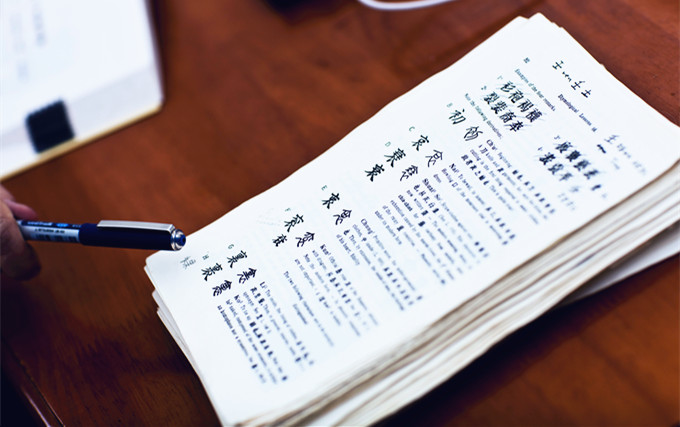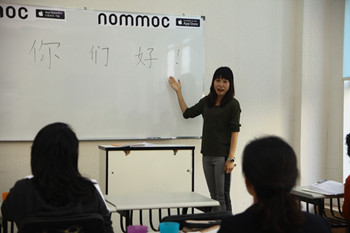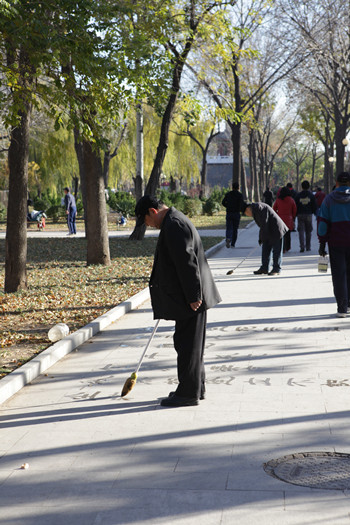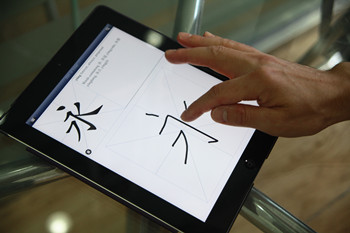 |
| Uncle Hanzi's etymology book. |
Are you illiterate? You probably think this is a stupid question, particularly as if you are reading this article, you obviously can read. However my meaning is, when it comes to the Chinese language, are you illiterate? Many foreigners here can speak Chinese and perhaps you are amongst that number, but if you can speak Chinese, can you read it? Maybe you can. If you can read Chinese, can you write it? Not all of us can. I can read many characters, but I can only write a handful, so to some extent I am illiterate. When I first started learning Chinese, I thought it was enough to be able to speak it, after all in any language the most important thing is that we understand what others are saying to us and that we can make ourselves understood by them. I used to get really embarrassed when I had to explain to people that I could not read, for instance in the supermarket, if I wanted to know if there was sugar in something I had to ask a fellow shopper. I always felt as if they were scornful of the fact that I couldn't read and needed their assistance, hence I determined to learn to read. Now I feel that even though I have sweat blood trying to learn these infernal characters, I now realise that it is still not enough. It feels strange to be able to read and not write. English and most other European languages are comparatively easy, you learn the alphabet then you can read and write. Chinese of course isn't like that, instead there are thousands of characters to be learned. Consequently I am now expending even more effort in trying to learn to write them.
Many people have remarked on the ability of African people to master languages quickly, and indeed they seem to race ahead of others learning Chinese too. Learning characters also comes easy to Japanese and Korean people. Japanese has many traditional Chinese characters, and in ancient times Chinese was also spoken by Koreans, so that even today if you go to Korea you can see many signs written in traditional Chinese. Of course now Koreans have their own language but their written characters or Hangeul seem to be based on the same kind of principle as Chinese as they look like pictures, so I think their brains are already hardwired to remember Chinese characters.
Characters are what make the Chinese language so hard for Westerners. There is nothing that we can relate to. English speakers can look at other written European languages and we can sometimes guess the meaning, as these are all Latin based languages and many root words are the same. But where do we start with Chinese, there are no mutual points that we can recognise? If you are learning Chinese characters, have you ever tried to look up one in a dictionary? Seemingly impossible as you also have to learn the radicals and how many strokes there are to a character before you can look it up. What if you don't know how many strokes a particular character has? Then you can forget it, the dictionary will be of no use to you.
WHY SO DIFFICULT?
 |
|
A teacher is demonstrating the characters on a Chinese learning lesson. |
Why are characters so difficult for us to learn? I have tried numerous methods, writing them on sticky post it notes and placing them around the house, flashcards, including making my own, computer programmes testing me daily, and various other methods none of which have really worked for me. I don't know why they just won't stick in my brain. There have been times when I have been in absolute despair at my inability to retain them, particularly when I am tired they seem to start dancing on the page. Also it seems to me that so many of them look the same. If I see some similar characters all together, it is clear that they are not the same, but if I separate them, sometimes I really cannot tell the difference between them, which my tutor thinks is ridiculous. For instance (我 (I), 找 (look for) and 钱 (money). Don't they all look similar to you?
Having said this, some characters are really easy to remember because they look like the word they represent. The character to fly is 飞. Doesn't it look exactly like a bird? Another one that I find easy to remember and that can often be found outside high class restaurants is 鼎. It looks like two chairs and a table. It is actually an ancient cooking cauldron with two looped handles. There are other characters which I like so I can remember. 曾is really cute because it has a face and looks a little angry. 乒乓are the characters for Ping-Pong (table tennis) and I find them really to recognise too. 凸, means convex or to stick out and the bit at the top really does stick out. One character I think is really obvious is 哭, which means to cry and if you look closely you will see a teardrop coming out of the right hand "eye". Anyway apart from these easy to recognise ones, there are thousands of others that I cannot memorise. Nobody seems sure as to exactly how many characters there are, and if you ask ten people, you will get ten different answers.
A DYING ART
An unusual problem regarding characters is also worrying teachers and experts alike. Now with the technological age, there is less and less need to write characters and because so many youngsters text or type emails, which just means typing pinyin and it will automatically change to characters, they are losing the ability to write. What a tragedy, thousands of years of culture is being eroded by the very things that are supposed to advance us as a society. In the eyes of many people, this is not advancement but rather a step back.
 |
| An old man is practicing characters on the ground. |
If you go into Shui Shang Park in the early morning, you will see many people writing beautiful characters with huge paintbrushes, they actually use water to write poems and wise sayings. One particularly talented man uses one hand to write English and the other to write Chinese. The problem is they are all old people, all past retiring age. There are no young people that have this hobby and if you ask anyone below 30, they will confess that their handwriting is not good. Text speak has murdered the English language, it seems a pity that it will also do the same to Chinese, at least as far as characters are concerned.
DO WE REALLY NEED TO LEARN CHARACTERS?
Actually there is no simple answer to this question and there is no right or wrong answer. It of course depends on your motive for being here, and whether or not your future career can be helped by speaking, reading and writing Chinese. I found out recently to my great surprise that it is no longer enough to just speak good Chinese. There has been a great sea change in the job market here. Before, companies were falling over themselves to recruit foreigners. They didn't particularly care where they came from or what skills they had. Having a foreigner in the company gave them face and showed that they were prosperous enough to pay the high salaries that foreigners demanded. Now however, there are more foreigners that are interested in coming to work in China and the market is swamped, so unfortunately we are now two a penny. Also Chinese children are starting to learn English at kindergarten level, so the number of Chinese people who can speak fluent English is rising rapidly. Why should a company now employ an illiterate foreigner when they can employ a bilingual Chinese at a much lower salary? Hence the bar is being raised and any foreigner who can read and write Chinese is now very much on the wish list of companies that are looking to employ a foreigner.
This is not to say that if you are totally illiterate you will not be able to get employment, indeed there are many foreigners employed here as say English teachers who do not need to speak Chinese. In fact in their case the schools do not actually want them to be able to speak Chinese, as it will hinder the students from speaking English all the time. There are also many executives and hotel managers who do not speak Chinese and have great jobs, but these people have desirable irreplaceable skills so they can control that particular job market. It may also be that you are in the right place at the right time and have the right connections, and will be handed a great job on a plate, without knowing any Chinese. However this kind of situation is becoming more and more rare, as Chinese companies are now demanding more value for money.
Students wishing to come here to study majors like Chinese medicine find that for one year they have to study Chinese extremely diligently, before they can even start to learn the basics in their chosen majors.
I was initially put off learning characters when I started to learn in school here because the teachers rigidly stuck to the text books which were of no use to us at all. In the reading class we had to read things like "The temperature in Beijing is 35 degrees today. In Tianjin the temperature is also 35 degrees today. In Shanghai…….." blah blah blah. The book went on to list numerous cities and their temperatures and other weather conditions. I asked the teacher if she could teach us to read things like labels in supermarkets, things that could really help our day to day life in China. For instance I would have found it really helpful to know which foods were spicy. Or if I had a cold, what kind of medicine I should look for at the pharmacy. The teacher told us she had to teach the textbook even though she admitted it was of no use to us at all. I quit that class and gave up studying characters for a while.
A DIFFERENT KIND OF SCHOOL

The character studying APP
As I had such a negative experience studying characters at school, a friend persuaded me to go along to have a look at his school, which is located at the Ao Cheng complex. What I saw and learned there surprised me. The school mainly focuses on passing the HSK, they are specialists in it, although there are also many students who just go in order to have a spoken Chinese class. The HSK is the government approved aptitude test for Chinese and previously I thought it was really scary. However I spoke to Mr. Yang, who has been teaching HSK for 14 years and so is the school's most experienced teacher, and he explained that they can get a student through the HSK 4 or 5 (there are six levels), within three months. The student just needs to spend 1½ hours at school every day and then spend a further two hours studying at home. For students this would be no problem, after all they are here to study, but for busy people who are working most of the day already, many of whom have families, to expect them to spend this huge amount of time studying is unrealistic. However the school also has the answer to this problem, but more about that later.
Mr. Yang confirmed that the school's Western students found it a lot harder to take in and concentrate on characters than their Korean and Japanese counterparts, although our spoken Chinese, particularly our accent is much better than theirs. The Asian students already have a head start, not only because they are already familiar with Chinese characters, but also because their brains and education system are already geared up to adopt the kind of repetitious learning that is needed to absorb characters. We get bored and give up when we do not immediately get results. Also Japanese and Korean students have a bigger motive than us for applying themselves to learning characters. If their Chinese is good in all aspects, they can find a good job in their own countries. I have noted that even in England, the larger, expensive shops like Harrods and Selfridges and the luxury brands are now asking for sales assistants who speak Chinese.
Regarding the HSK, in fact there is one form of the HSK which can be studied on the internet, thereby avoiding the use of characters and guess which group of people is most likely to use that? Mr. Yang told me a crucial point, they first find out why someone wants to learn Chinese, and then they can tailor the course accordingly for each individual. The bigger schools and universities are not able to cater for individual students and the classes are large. The quieter students or those with less ability to learn characters are overwhelmed and swallowed up (me!). Of course why you want to learn Chinese has a big effect on the way you learn and the speed at which you learn – simple but true.
 |
| Uncle Hanzi |
I also gleaned some very important information from the school's founder, Zhao Peng. He gave me one of the best quotes I have ever heard. He said "If you learn to speak Chinese, it is like having one leg. You will be able to walk with the aid of crutches but not very well. Reading and writing characters gives you the other leg. You need two legs in order to be able to run and jump". Really this is so true. Speaking Chinese enables you to live fairly comfortably without having to rely on other people. However reading and writing opens far more doors and takes you to another level as far as independent living is concerned.
Mr. Zhao went on to explain the difficulties involved in learning characters, "When you start learning Chinese you basically have to learn two languages as it were. You learn pinyin in order to be able to pronounce the words and then just as you are familiar with pinyin, you find it is not enough and then you also have to learn characters". Mr. Zhao has the distinction of opening the first privately owned school that is able to provide study visas. He takes his responsibilities very seriously and even though he is the owner and founder of the school with numerous employees, he takes it upon himself to meet the students at the airport, and personally takes them to the health centre to have the health check carried out. If you came here to study, remember that nightmare trip to the hospital? It is something that is indelibly engraved on my memory and I shudder every time I think of it, hence this personal service is a really big deal. Mr. Zhao says his school emphasises the HSK test, because in time it will become as important for gauging proficiency in Chinese, as the TOEFL or IELTS English test is. As the eyes of the world's business markets are turning to China, it is easy to believe that speaking, reading and writing good Chinese is highly desirable. The Confucius Institute, which is a government backed initiative, is currently on a drive in many countries to persuade people of the benefits of learning Chinese.
Mr. Zhao emphasised that the HSK is now much easier than it was, and this is deliberate, the government is keenly interested in helping foreigners advance in the Chinese language and it was recognised that it was simply too hard for most Westerners. "If we can get the students interested in Chinese characters, they will be far more motivated and will progress much more quickly. Part of that motivation process involves speeding up their learning and once they see how far and how quickly they have progressed, they will want to personally strive even harder".
 |
| Zhao Peng, the school founder |
Adding to the difficulty of Westerners not being familiar with the concept of using pictures to read, the fact is even when we study we are not exposing ourselves to characters enough. Mr. Zhao pointed out that sometimes even Chinese people will occasionally come across a character that they do not know, or at least do not know how to write, simply because of lack of use. He stresses that there is no simple way to learn characters as everybody absorbs information differently. However what is clear is that there is no way to avoid spending time on this and it goes without saying that the more time you spend, the more characters you will learn.
For those busy busy busy businessmen, there is a tool that the school has developed which you can download to your Apple device, which is perfectly designed to help you learn characters, even if you just have five minutes a day to spare. You can download this by logging on to the school's website, www.NOMMOC.com.
I also spoke to one of the students at the school, Dionne, a Canadian lady, she said "My Chinese is now not bad, I am learning just for survival purposes, it makes things easier if you live here. At first it was very frustrating but now I can get around and use the language. I tried twice to learn characters but I did not really want to spend that much time learning to read and write, although people have suggested to me that at the very least I learn to read. I agree I am illiterate when it comes to Chinese".
Although Dionne has lots of Chinese friends who are willing to help out when she gets stuck, like me she also discovered the hard way what it means not to be able to read. There are always notices pinned up in the lobby of the apartments and I always used to ignore them. However once the notice was urging us to contact the central heating people to make an appointment in order to sort the heating out. As usual I ignored it as I couldn't read it, and the result was my heating did have a problem but they were not willing to come out as the time for appointments had already passed. "Didn't you read the notice?" they asked me when I phoned to complain that nobody had come. What could I say? Should I have admitted "I am a foreigner and cannot read"? It was too humiliating. Dionne says that she now asks what the notices say. I am happy to report that I can now read them myself. She also agrees with me that our brains work in different ways and there are different pathways for different functions, so maybe Westerners do not have the necessary mapping in order for characters to stick in our heads. Being able to read means that you can go to a restaurant and know exactly what to order. Which reminds me, the character for dog is 狗gǒu。Of course I avoid places that sell dog meat, and so for the first two years after I came here I avoided 狗不理gǒubùlǐ bāozi because I thought they used dog meat. I now know that no dogs are used in the making of their bāozi!! Think also how great it must be to be able to read the signs at the bus stop. Really to be able to read is to be almost totally independent.